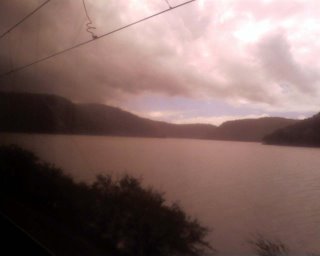There is something about a river that gives it a personality. This is probably best evidenced in all those famous songs about the Mississippi River in America, like 'Old Man River' in which the mighty Miss is personified as Father Time.
I grew up on the banks of another famous river which has given me cause to ponder many a time what that means and how it has made me. It wasn't an idyllic river where you would go swimming or fishing or even boating for fun. It was an industrial highway, a spine in the steel and coal industries, and probably would make you sick if you accidentally drank any of its water or ate any of its inhabitants. But there was still pride in our river, and a sense of awe when, even as an adult, I visited other towns miles and miles downriver and thought 'hey, that's my river.' I think it's the same for people anywhere who live on a river.
What's all this talk about rivers? Well, I just finished a magnificent book about one. I admit I was skeptical when I saw that Kate Grenville's The Secret River had been shortlisted for the Booker Prize. The one book I'd previously attempted by Kate was thrown across the room in agony and disgust, unfinished. (I can count on one hand the number of books I've tried but not finished, so that's saying something.) But, as you know, I have this thing about the Booker Prize, so I had to read this one.
Let me say this first: it is not a Booker Prize winning book. I think the judges in the Booker tend to reward authors who are more artistic with their words, who dab words on a page in a carefully considered fashion like a pointillist painter would fill in their canvas with dots. You'll read a lot of great books when you follow the Booker, and usually it's the more challenging ones that win the prize, the ones that took you longer to read, that put you to sleep, or that nearly brought you to the brink of throwing it aside. The shortlist also always contains a few books which are bloody great yarns - and this is one of them. As carefully as I'm sure this book was crafted, its language is simple and flowing, its story told with a beginning, middle, and end - the result is a not-too-taxing book that will win heaps of literary prizes, just not the Booker.
Although the dustjacket will tell you The Secret River is about a man called Will, who is transported to New South Wales as a convict in the early days of the 19th century, the book struck me as being more about the Hawkesbury River, Australia's first breadbasket, and the scene of the earliest settlement in Australia of freed convicts. It is an exceptionally rich place, historically, and an exceptionally complex place, geographically. Kate Grenville opens up the mysterious reaches and bends of the river through her characters' eyes with a presence that history books always fail to deliver, and that historical fiction usually fails to achieve.
The book made me ponder lots of things. What it means to make your living from a river. What it means to own land. What it means to be a forced migrant. Probably the best achievement of The Secret River is the telling of the story of early contact between the English colonists and convicts and the local Aboriginal people. Although I don't think early contact is something which is unexplored in modern day Australia, I don't know of any other attempts which tell the story so populated with believable, understandable, and identifiable characters like this book has.
I don't know any non-Aussies who have read this book yet (but I do know a few who will be getting a copy for Christmas), but I don't think it's a book that is unexportable. I highly recommend it to anyone who'd like to walk a few metres in the shoes of a transported convict and I would love to hear what you thought of it.






<< Home